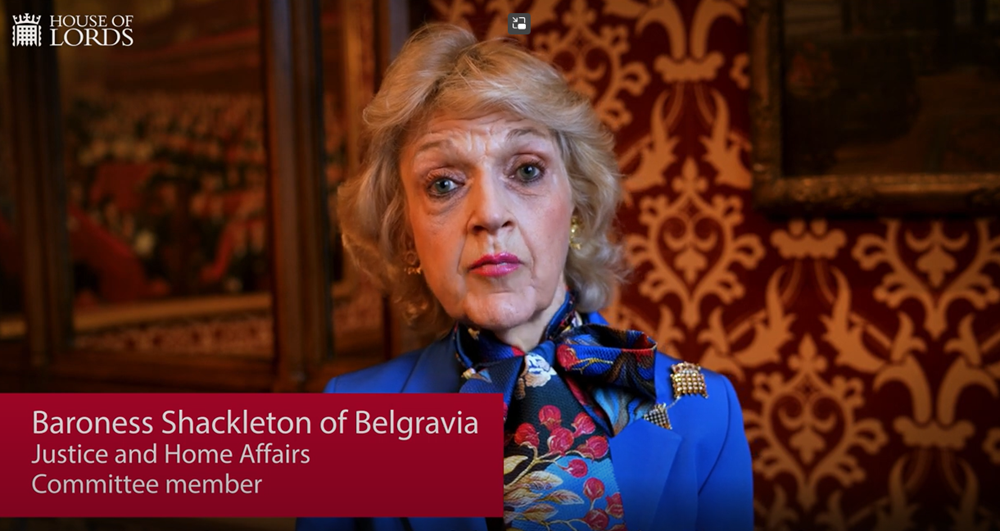Highlights from the 2022-23 session in the House of Lords
26 October 2023
After more than 1700 hours of business, with over 180 votes on changes to draft laws and members pressing government decisions and actions in more than 770 questions, the House of Lords 2022-23 session has come to an end.
Catch up on highlights from a packed session in the Lords.
Changing laws
Much of House of Lords' time, about 60%, is spent scrutinising and improving legislation. Members examine each bill line by line and, unlike in the Commons, all proposed changes are debated. Not all changes result from a vote in the House. Many amendments to bills are made by the government following Lords members' recommendations and acting on concerns raised during debates.
- Find out more about the role of the House of Lords in legislation in the Lord Speaker's Corner video series.
Changes to draft laws in this session of Parliament include:
Online Safety Act
The Lords completed its further examination of the Online Safety Bill in July. The government accepted several changes to the bill originally put forward by Lords members on topics including AI-generated content, age verification to prevent children accessing pornographic content, disclosing information held by service providers to the parents of a deceased child and Ofcom guidance on protecting women and girls.
Members also asked the government to think again on offences relating to animal torture content and features and functionalities of online services that are harmful to children.
Financial Services and Markets Act
Members of the Lords scrutinised the Financial Services and Markets Bill and suggested several changes to the bill on topics including the UK's net zero targets, financial inclusion and banking reform.
During report stage, members put forward a change to place restrictions on commercial activity related to forest risk commodities, globally traded goods that contribute to deforestation. After consideration in the Commons, the government and Lords agreed to compromise on a change to require the Treasury to review the adequacy of the UK financial system in eliminating the financing of the use of prohibited forest risk commodities.
National Security Act
During the bill's progress through the House, members inserted a new clause into the National Security Bill on foreign interference in elections. The new clause would require political parties to publish policy statements identifying donations from a foreign power and provide the Electoral Commission with an annual risk statement on how overseas donations are managed.
After consideration in the Commons, Lords members suggested a revised version of the clause, which retains the duties placed on the political parties, and which the Commons agreed to.
Illegal Migration Act
After more than 75 hours of scrutiny, the Illegal Migration Act became law in July with changes on time limits for detention of children and pregnant women, plus the application of the bill to immigration and asylum cases retrospectively, following Lords proposals earlier in the bill's progress.
Ballot Secrecy Act
Lord Hayward's private member's bill became law in May after it passed all of its stages in Parliament. This new law creates offences for individuals who accompany a voter to a polling booth, or position themselves nearby, with the intention of influencing the voter's ballot.
Retained EU Law (Revocation and Reform) Act
The Retained EU Law (Revocation and Reform) Bill was passed by both Houses of Parliament in June. The government made changes to the bill on its 'sunsetting' of retained laws and reporting to Parliament following changes proposed by members of the Lords.
Levelling-up and Regeneration Act
Members considered over 1,200 changes to the Levelling-up and Regeneration Bill during 139 hours of scrutiny.
The government made changes to the bill previously suggested by Lords members on protecting ancient woodland and mitigating and adapting to climate change in national development policies.
Investigating public policy
House of Lords committees play a vital role in examining public policy, proposed laws and government action.
The Communications and Digital Committee found that people of all ages and backgrounds are being left behind as services and personal lives move online in its report on digital exclusion.
The Justice and Home Affairs Committee raised concerns on the impact of migration policies on families.
Special investigative committees
This session, four special investigative committees were set up to explore specific issues outside of the main committees’ subject areas. These covered primary and community care, autonomous weapons, the future of the horticultural sector and education of 11-16 year olds.
Challenging government action
Members of the Lords check and challenge the work of government through questions and debates in the chamber. This session members have pressed the government on topics including:
- dangerous dogs
- school attendance
- regulating AI
- water company bills
- economic inactivity
- brain tumour research
- energy costs
- advertising and body image
- UK asylum and refugee policy
- Iran demonstrations
- tackling violent crime.
Image: House of Lords / Roger Harris



